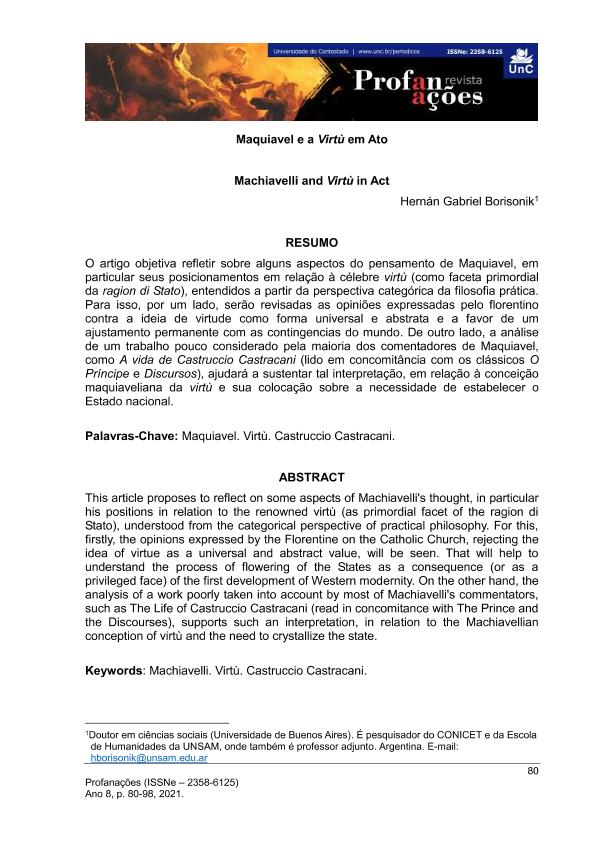Mostrar el registro sencillo del ítem
dc.contributor.author
Borisonik, Hernan Gabriel

dc.date.available
2022-10-13T16:27:25Z
dc.date.issued
2021-04
dc.identifier.citation
Borisonik, Hernan Gabriel; Machiavelli and Virtù in Act; Universidade do Contestado; Profanações; 8; 4-2021; 80-98
dc.identifier.issn
2358-6125
dc.identifier.uri
http://hdl.handle.net/11336/173074
dc.description.abstract
O artigo objetiva refletir sobre alguns aspectos do pensamento de Maquiavel, em particular seus posicionamentos em relação à célebre virtù (como faceta primordial da ragion di Stato), entendidos a partir da perspectiva categórica da filosofia prática. Para isso, por um lado, serão revisadas as opiniões expressadas pelo florentino contra a ideia de virtude como forma universal e abstrata e a favor de um ajustamento permanente com as contingencias do mundo. De outro lado, a análise de um trabalho pouco considerado pela maioria dos comentadores de Maquiavel, como A vida de Castruccio Castracani (lido em concomitância com os clássicos O Príncipe e Discursos), ajudará a sustentar tal interpretação, em relação à conceição maquiaveliana da virtù e sua colocação sobre a necessidade de estabelecer o Estado nacional.
dc.description.abstract
This article proposes to reflect on some aspects of Machiavelli's thought, in particular his positions in relation to the renowned virtù (as primordial facet of the ragion di Stato), understood from the categorical perspective of practical philosophy. For this, firstly, the opinions expressed by the Florentine on the Catholic Church, rejecting the idea of virtue as a universal and abstract value, will be seen. That will help to understand the process of flowering of the States as a consequence (or as a privileged face) of the first development of Western modernity. On the other hand, the analysis of a work poorly taken into account by most of Machiavelli's commentators, such as The Life of Castruccio Castracani (read in concomitance with The Prince and the Discourses), supports such an interpretation, in relation to the Machiavellian conception of virtù and the need to crystallize the state.
dc.format
application/pdf
dc.language.iso
por
dc.publisher
Universidade do Contestado
dc.rights
info:eu-repo/semantics/openAccess
dc.rights.uri
https://creativecommons.org/licenses/by-nd/2.5/ar/
dc.subject
MAQUIAVEL
dc.subject
VIRTU
dc.subject
CASTRUCCIO CASTRACANI
dc.subject.classification
Otras Ciencia Política

dc.subject.classification
Ciencia Política

dc.subject.classification
CIENCIAS SOCIALES

dc.title
Machiavelli and Virtù in Act
dc.type
info:eu-repo/semantics/article
dc.type
info:ar-repo/semantics/artículo
dc.type
info:eu-repo/semantics/publishedVersion
dc.date.updated
2022-09-21T10:38:37Z
dc.journal.volume
8
dc.journal.pagination
80-98
dc.journal.pais
Brasil

dc.description.fil
Fil: Borisonik, Hernan Gabriel. Universidad Nacional de San Martin. Escuela de Humanidades. Laboratorio de Investigacion En Ciencias Humanas. - Consejo Nacional de Investigaciones Cientificas y Tecnicas. Oficina de Coordinacion Administrativa Pque. Centenario. Laboratorio de Investigacion En Ciencias Humanas.; Argentina
dc.journal.title
Profanações
dc.relation.alternativeid
info:eu-repo/semantics/altIdentifier/url/http://www.periodicos.unc.br/index.php/prof/article/view/3352
dc.relation.alternativeid
info:eu-repo/semantics/altIdentifier/doi/http://dx.doi.org/10.24302/prof.v8.3352
Archivos asociados
